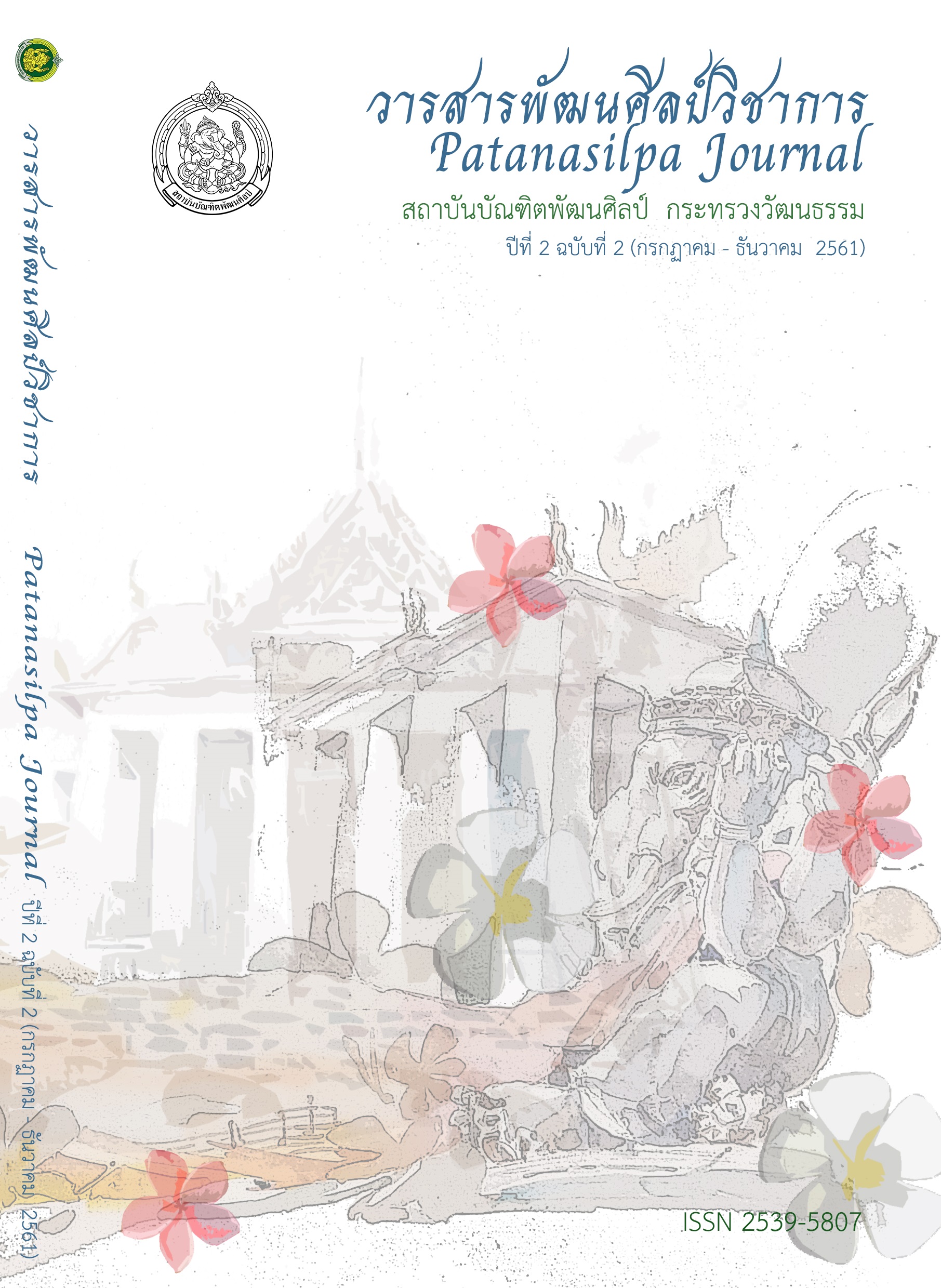THE COMPARISON OF MATHEMATICS SKILL FOR MATTHAYOMSUKSA 2, SUPHANBURI COLLEGE OF DRAMATIC ARTS BETWEEN PROBLEM BASED LEARNING AND LEARNING BY MANUAL OF THE INSTITUTE FOR THE PROMOTION OF TEACHING SCIENCE AND TECHNOLOGY
Keywords:
Mathematics Problems solving skill, Problem-based learningAbstract
The purposes of this research were (1) To compare the mathematics problems solving skills on percentage problems solving learning of Matthayomsuksa 2 students by using problem-based learning and IPST learning handbook (2) To compare the learning achievement of mathematics problems solving skills on percentage problems solving learning after studying by using problem-based learning and IPST learning handbook for Matthayomsuksa 2 students and (3) To study the retention of mathematics problems solving skills on percentage problems solving learning after using problem-based learning for Matthayomsuksa 2 students. The samples of this research were 35 students each in 2 classes of Matthayomsuksa 2. The students who were studying in the first semester of the academic year 2017 at Suphanburi collage of dramatic arts were selected using the cluster random sampling technique. One room was chosen to be the experimental group that studied Math by using problem-based learning and the other room was chosen to be the control group that studied Math by using IPST learning handbook. The research instruments were the mathematics problem-based learning plans, IPST learning plans, the test of mathematics problem-based learning skill on percentage problems solving learning, the achievement test on percentage problems solving learning. The research design was pretest-posttest design. Frequency, percentage, average, standard deviation and t-test were used to analyze the data.
The result of research showed that the mathematics problems solving skills on percentage problems solving learning of Matthayomsuksa 2 students who studied math using problem-based learning was higher than IPST learning handbook with statistical significance at .01. The learning achievement on percentage problems solving learning of Matthayomsuksa 2 students by using problem-based learning was higher than IPST learning handbook with statistical significance at .01 and the retention of mathematics problems solving skills on percentage problems solving learning for Matthayomsuksa 2 students by using problem-based learning was higher than the 70 percent criteria.
References
กรมวิชาการ. (2551). หลักสูตรการศึกษาขั้นพื้นฐาน พุทธศักราช 2551. กรุงเทพฯ: องค์การค้ารับส่งสินค้าและพัสดุภัณฑ์.
กระทรวงศึกษาธิการ. (2551). หลักสูตรแกนกลางการศึกษาขั้นพื้นฐานพุทธศักราช 2551. กรุงเทพฯ: ชุมนุมสหกรณ์การเกษตรแห่งประเทศไทย.
คณะกรรมการการศึกษาขั้นพื้นฐาน. (2551). หลักสูตรแกนกลางการศึกษาขั้นพื้นฐานพุทธศักราช 2551. กรุงเทพฯ: ชุมนุมสหกรณ์การเกษตรแห่งประเทศไทย.
ทิศนา แขมมณี. (2555). ศาสตร์การสอน: องค์ความรู้เพื่อการจัดกระบวนการเรียนรู้ที่มีประสิทธิภาพ. กรุงเทพฯ: สำนักพิมพ์แห่งจุฬาลงกรณ์มหาวิทยาลัย.
ทองสุข รวยสูงเนิน. (2552). รูปแบบการจัดการเรียนการสอนเพื่อพัฒนาการคิด. กรุงเทพฯ: สถาบันพัฒนาความก้าวหน้า.
นุศรา หมัดอะต้ำ. (2555). การเปรียบเทียบความสามารถในการคิดแก้ปัญหา และความคงทน ในการคิดแก้ปัญหาที่จัดการเรียนรู้โดยใช้ปัญหาเป็นฐานกับการจัดการเรียนรู้แบบปกติในกลุ่มสาระการเรียนรู้คณิตศาสตร์ สำหรับนักเรียนชั้นประถมศึกษาปีที่ 3. วิทยานิพนธ์ปริญญาการศึกษามหาบัณฑิต สาขาการวิจัยและประเมินผล บัณฑิตวิทยาลัย มหาวิทยาลัยทักษิณ.
ล้วน สายยศ และอังคณา สายยศ. (2543). เทคนิคการวัดผลการเรียนรู้ (พิมพ์ครั้งที่ 5). กรุงเทพฯ: สุวีริยาสาส์น.
วันดี ต่อเพ็ง. (2553). ผลการจัดการเรียนรู้โดยใช้ปัญหาเป็นหลักที่มีต่อผลสัมฤทธิ์ทางการเรียนคณิตศาสตร์ เรื่อง โจทย์ปัญหาสมการเชิงเส้นตัวแปรเดียวของนักเรียนชั้นมัธยมศึกษา ปีที่ 1. สารนิพนธ์การศึกษามหาบัณฑิต บัณฑิตวิทยาลัย มหาวิทยาลัยศรีนครินทรวิโรฒ.
วาสนา กิ่มเทิ้ง. (2553). ผลการจัดการเรียนรู้โดยใช้ปัญหาเป็นฐาน (Problem-Based Learning) ที่มีต่อทักษะการแก้ปัญหา ทักษะการเชื่อมโยงทางคณิตศาสตร์ และความใฝ่รู้ใฝ่เรียนของนักเรียนชั้นมัธยมศึกษาปีที่ 3. วิทยานิพนธ์ปริญญาการศึกษามหาบัณฑิต บัณฑิตวิทยาลัย มหาวิทยาลัยศรีนครินทรวิโรฒ.
สิริพร ทิพย์คง. (2547). การแก้ปัญหาทางคณิตศาสตร์. กรุงเทพฯ: คุรุสภาลาดพร้าว.
อรุณรุ่ง ปภาพสิษฐ. (30 มิถุนายน 2560). Problem-based learning. [ออนไลน์]. เข้าถึงจาก http://old-tedu.pnru.ac.th/upload-files/uploadfile/29/6e682264abd39e8c64b39960ff4c2a0b.pdf
Barrow, H., S., & Tamblyn, R., M. (1980). Problem-Based Learning: An Approach to Medical Education. New York: Springer Publishing.
Downloads
Published
Issue
Section
License
บทความที่ได้รับการตีพิมพ์เป็นลิขสิทธิ์ของ สบศ.






